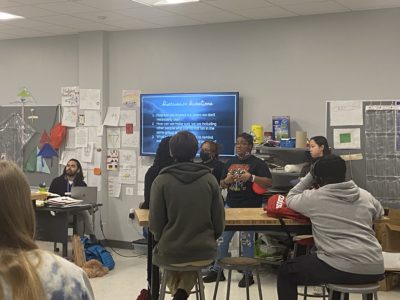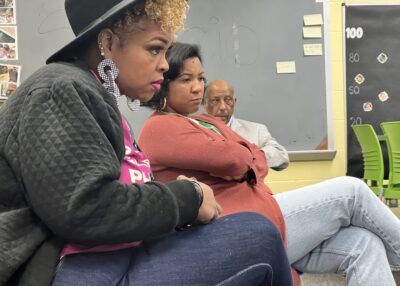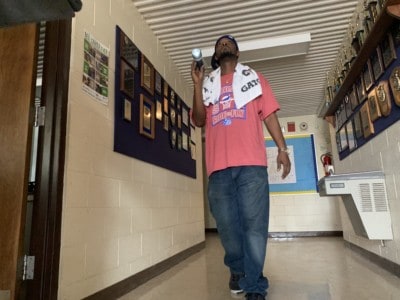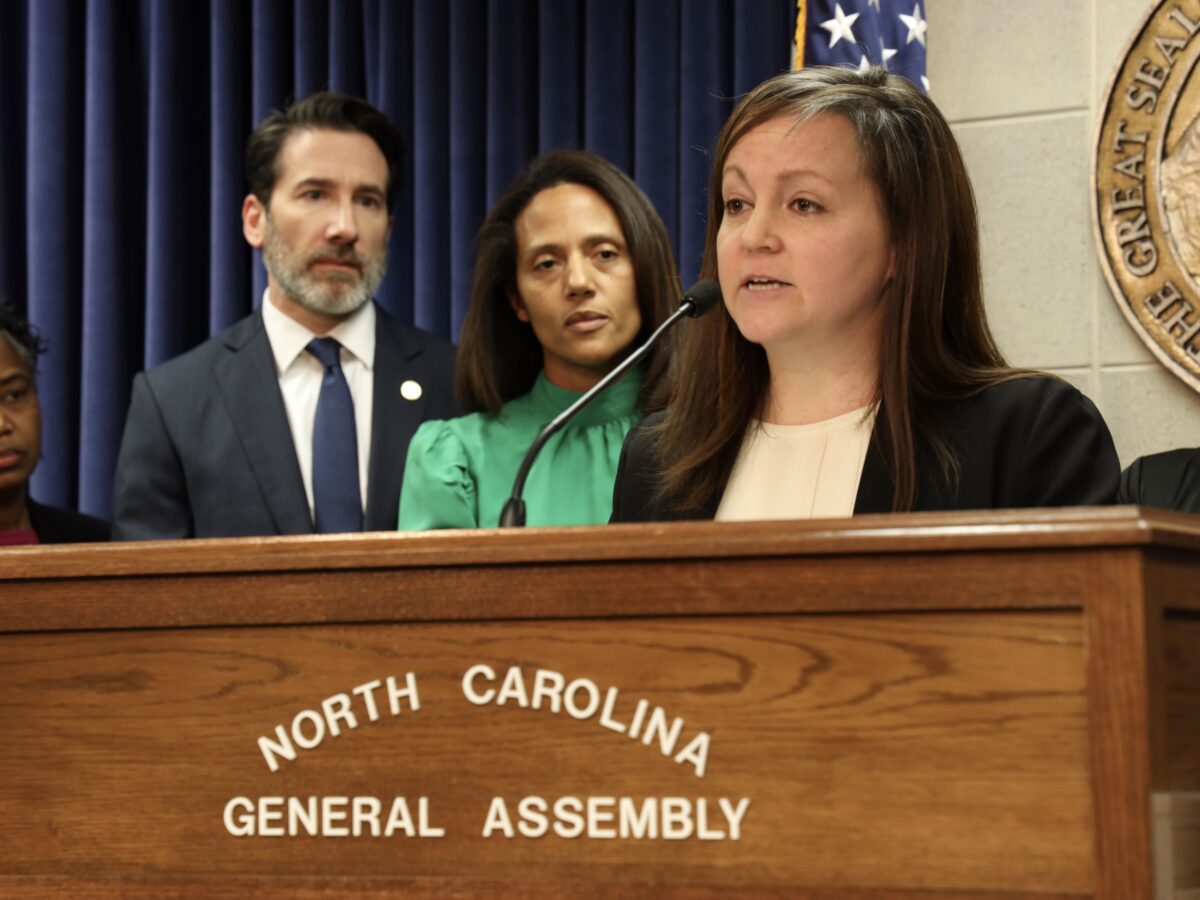
Share this story
|
|
Highlights
- Democrats and Republicans have both introduced versions of a “Parents’ Bill of Rights.”
- Republicans say their bill is common sense legislation that makes clear the upbringing of a child is a parent’s right, while Democrats point to dangers it could bring to students.
- “We have so many other important needs and issues that should be at the top of our list when thinking about how to support our students and strengthen our schools,” one superintendent said.
- A majority of North Carolina educators report that parents are already influential in school communities.
- At the same time, nearly one in 100 children in North Carolina experienced abuse or neglect by a caregiver in 2020. The Republican bill does exempt schools from notifying parents of behavior if they believe there is a risk for abuse.
- According to the most recent Youth Risk Behavior Survey, nearly half of all LGBTQ+ youth in North Carolina seriously considered attempting suicide.
In 2020, nearly one in 100 children in North Carolina experienced abuse or neglect by their parents, guardians, or caretakers, according to data from the N.C. Departments of Health and Human Services and Social Services.1 That same year, every district in the state adopted plans to better serve student mental health and create crisis response teams.
As the General Assembly debates the latest version of a Republican-sponsored bill entitled “Parents’ Bill of Rights,” educators want legislators to remember a few things: Not every parent can always show up in positive ways for their children, public schools are sometimes where kids feel safest, and teachers and parents aren’t enemies.
“It’s not just hypothetical,” said Scott Elliott, superintendent of Watauga County Schools. “Even with open communication with parents, we’ve seen real issues that escalated into domestic disputes and assaults on children that required DSS intervention. These are real issues that children, families, and schools are dealing with and they should not be reduced to political footballs.”
Republican sponsors of the bill say it’s common sense legislation that makes clear the upbringing of a child is a parent’s right. But as the Democrats introduced their own bill of rights on Tuesday — one for parents and students — a Democrat sponsor of the bill called the Republican version “actively dangerous.”
“Instead of respecting and empowering parents, this bill seeks to turn parents and teachers against each other,” Michael Garrett, D-Guilford, said of the Republicans’ Senate Bill 49.
Is the wrong debate playing out in the legislature?
During the Senate health care committee hearing on this bill last week, bill sponsor Sen. Amy Galey, R-Alamance, said there’s no question a parent cares more about their child’s future than teachers. She was addressing a comment from North Carolina Association of Educators President Tamika Walker Kelley, who said educators and parents are equally committed to ensuring student success.
For Jermaine White, the assistant superintendent for student support services in Harnett County Schools, the issue isn’t really parents vs. teachers. He believes parents are largely supportive of schools, and the real issue is how both groups can work together for kids.
“It is certainly a team effort to be able to facilitate what’s best for the child, especially in situations where parents may be at a bit of a disadvantage for whatever reason,” he said. “We try to do a good job of filling in some of the gaps, even though we may not be able to do it completely.”
Studies show that parents believe education has become too politicized. The teacher vs. parents dichotomy that’s resulted doesn’t resonate to White, who says his district is establishing positive school and home collaborations.
As part of its work to better serve student mental health, the district has focused on improving family engagement and continues to add grant funding to bolster these efforts.
“I think our parents appreciate (that we’re) able to help their child,” he said. “Not that we’re trying to replace the parents, not that we’re trying to do their jobs, but there are certain aspects of what we do that blend into what’s going on inside of the house.”
How schools show up when parents can’t
Educators point to myriad ways they step up to support students.
Recently, EdNC featured a school that teaches kids to ride bikes. Schools offer several options to feed students who might not have time or resources to eat before school. Several districts partner with organizations to provide school supplies and other resources through backpack buddy programs. An entire school district trained its staff to become “heart-safe” to help kids with cardiac issues.
“We work really hard to keep open lines of communication with parents, and it is often parents who approach us because they are concerned for their children’s safety,” Elliott said. “Our teachers and counselors know their students and families really well, and they know when a child might be at risk of harm due to conflicts within families or due to issues of mental health or substance abuse. We never want to put a child in harm’s way.”
Every district in North Carolina has mental health support plans for students in place. While many already had established systems of support, these processes were formalized statewide after the General Assembly passed the School-Based Mental Health Act in 2020.
Despite funding shortages, districts found ways to connect kids to specialized support either inside or outside of school buildings.
“I have in my office notebooks, thick notebooks, of evidence and things that we find as far as these abuse and neglect cases that will break your heart,” White said. “But at the end of the day, if we’re able to … protect the child, keep them safe, provide them with some things that they need to be able to help transition mentally and that sort of thing — then we’ve done our job.”
Where school personnel feel under-resourced in efforts to serve students
At a press conference where Democrats introduced their “Parents’ and Students’ Bill of Rights,” 2021 Southeast Regional Teacher of the Year Jennie Bryan said, “there are great things happening in North Carolina classrooms to be celebrated, and yet we face significant challenges.”
Bryan, a high school social studies teacher, and Nakeia Alsup, a former public school social worker, spoke about school funding, gun violence, and student mental health.
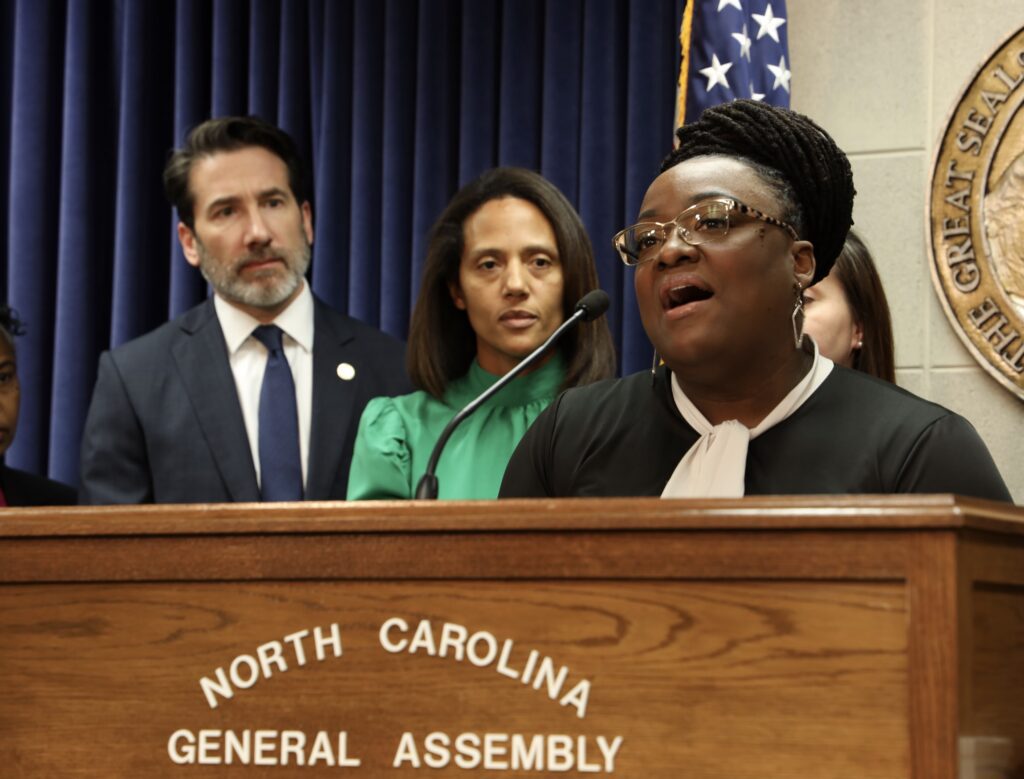
Alsup said she loved being a school social worker, but that it was bittersweet. She served five schools and more than 600 students, and some days she could only see one student given the urgent needs.
“School districts and educators need more support to better support students, not less, because of the lack of support for educators and mental health services in school,” Alsup said. “Educators and mental health professionals are leaving the field in droves.”
Bryan said she urges her social studies students to consider the context of the times when a document was written. She asked legislators to do the same with the different bill of rights legislation.
“Use what we know to be true about our students’ and schools’ needs to prioritize your efforts and get it right for the health, safety, and success of our students and schools of North Carolina,” she said.
Teachers say parents largely appreciate current engagement efforts
Teachers feel supported by parents and guardians at about the same percentage as previous years, even though they feel slightly less support by communities, according to the state’s most recent biennial survey of teacher working conditions.
The survey results were presented to the State Board of Education last year, while next door the Senate was preparing to hear (and ultimately pass) last session’s version of the Parents’ Bill of Rights. But according to the survey, 81% of educators reported that parents or guardians know what is going on in their schools.
The survey also found:
- 65% of educators said parents/guardians were influential decision-makers in the school.
- 87% said their schools maintain clear, two-way communication with the community.
- 85% said their school does a good job of encouraging parent/guardian involvement.
“They (the teachers) need us to support them,” said Alessandro Montanari, assistant director for the district and regional support division of the Department of Public Instruction. “They need us to thank them for everything they do every single day.”
What are the risks, and for what rewards?
During committee meetings on the Republican bill, and during the introduction of the Democrat bill, legislators agreed that engaging parents in a student’s education is important.
But some Democrats raised concern over teachers having to notify parents about things students say regarding their health – even when a student is opening up because they don’t feel safe sharing the information at home.
Julie Mayfield, D-Buncombe, said the notification provisions of § 115C-76.16 may force educators to break a child’s trust and leave some children without safe adults in whom to confide.
“What we know is that sometimes school is the only place that kids can have some conversations,” Mayfield said during a hearing of the bill in the Senate rules committee on Monday.
Although the bill currently before the Senate includes an exception to parent notification when an educator believes notifying a parent or caregiver might bring harm to the student, educators say school mental health professionals need room to operate and do their job – exercising their professional judgment.
“We’ll work within whatever scope we have to, but it would be great for them to have flexibility,” White said of his mental health support team. “I completely understand everybody’s viewpoint about how they feel regarding mental health and those issues, but I would just say, let’s continue to work together to evaluate what’s going to be best for kids.”
It’s an urgent task now as all students, and especially LGBTQ+ students, are reporting greater mental health challenges, according to the most recent Youth Risk Behavior Survey. In 2021, 22% of students reported that they seriously considered attempting suicide in the past 12 months. That figure is 48% for gay, lesbian, and bisexual students.
“We have so many other important needs and issues that should be at the top of our list when thinking about how to support our students and strengthen our schools,” Elliott said.
1 This hyperlink leads to a dataset compiled by the Annie E. Casey Foundation’s Kids Count Data Center, which uses statistics from DHHS and the N.C. Department of Social Services. You can find the most recent statistics about child abuse from NC FAST and DSS here.
Editor’s note: This article has been updated to reflect that Jennie Bryan is a 2021 Regional Teacher of the Year.



